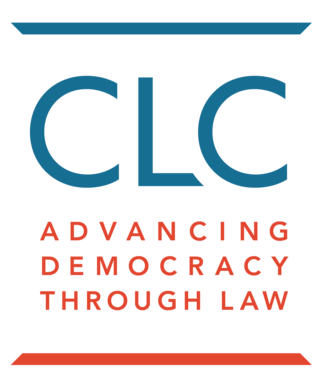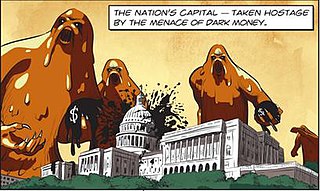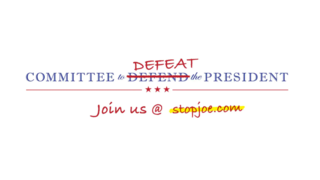Related Research Articles

Campaign finance laws in the United States have been a contentious political issue since the early days of the union. The most recent major federal law affecting campaign finance was the Bipartisan Campaign Reform Act (BCRA) of 2002, also known as "McCain-Feingold". Key provisions of the law prohibited unregulated contributions to national political parties and limited the use of corporate and union money to fund ads discussing political issues within 60 days of a general election or 30 days of a primary election; However, provisions of BCRA limiting corporate and union expenditures for issue advertising were overturned by the Supreme Court in Federal Election Commission v. Wisconsin Right to Life.
In the United States, a political action committee (PAC) is a tax-exempt 527 organization that pools campaign contributions from members and donates those funds to campaigns for or against candidates, ballot initiatives, or legislation. The legal term PAC was created in pursuit of campaign finance reform in the United States. Democracies of other countries use different terms for the units of campaign spending or spending on political competition. At the U.S. federal level, an organization becomes a PAC when it receives or spends more than $1,000 for the purpose of influencing a federal election, and registers with the Federal Election Commission (FEC), according to the Federal Election Campaign Act as amended by the Bipartisan Campaign Reform Act of 2002. At the state level, an organization becomes a PAC according to the state's election laws.
A 527 organization or 527 group is a type of U.S. tax-exempt organization organized under Section 527 of the U.S. Internal Revenue Code. A 527 group is created primarily to influence the selection, nomination, election, appointment or defeat of candidates to federal, state or local public office.
The Federal Election Campaign Act of 1971 is the primary United States federal law regulating political campaign fundraising and spending. The law originally focused on creating limits for campaign spending on communication media, adding additional penalties to the criminal code for election law violations, and imposing disclosure requirements for federal political campaigns. The Act was signed into law by President Richard Nixon on February 7, 1972.
In the United States, a political party committee is an organization, officially affiliated with a political party and registered with the Federal Elections Commission (FEC), which raises and spends money for political campaigning. Political party committees are distinct from political action committees, which are formally independent of political parties and subject to different rules.

An independent expenditure, in elections in the United States, is a political campaign communication that expressly advocates for the election or defeat of a clearly identified political candidate that is not made in cooperation, consultation or concert with – or at the request or suggestion of – a candidate, a candidate's authorized committee, or a political party. If a candidate's agent, authorized committee, party, or an "agent" for one of these groups becomes "materially involved", the expenditure is not independent.

The financing of electoral campaigns in the United States happens at the federal, state, and local levels by contributions from individuals, corporations, political action committees, and sometimes the government. Campaign spending has risen steadily at least since 1990. For example, a candidate who won an election to the U.S. House of Representatives in 1990 spent on average $407,600, while the winner in 2022 spent on average $2.79 million; in the Senate, average spending for winning candidates went from $3.87 million to $26.53 million.
Citizens United v. Federal Election Commission, 558 U.S. 310 (2010), is a landmark decision of the Supreme Court of the United States regarding campaign finance laws and free speech under the First Amendment to the U.S. Constitution. The court held 5–4 that the freedom of speech clause of the First Amendment prohibits the government from restricting independent expenditures for political campaigns by corporations, nonprofit organizations, labor unions, and other associations.
Super PACs, officially known as "independent expenditure-only political action committees," are unlike traditional political action committees in that they may raise unlimited amounts from individuals, corporations, unions, and other groups to spend on, for example, ads overtly advocating for or against political candidates. However, they are not allowed to either coordinate with or contribute directly to candidate campaigns or political parties. Super PACs are subject to the same organizational, reporting, and public disclosure requirements of traditional PACs.

Americans for a Better Tomorrow, Tomorrow was a United States political action committee (PAC) established by Stephen Colbert, who portrayed a character of the same name who was a mock-conservative political pundit on Comedy Central's satirical television series The Colbert Report. As a super PAC the organization could raise unlimited sums of money from corporations, unions and other groups, as well as wealthy individuals. Speaking in character, Colbert said the money would be raised not only for political ads, but also "normal administrative expenses, including but not limited to, luxury hotel stays, private jet travel, and PAC mementos from Saks Fifth Avenue and Neiman Marcus."

Campaign Legal Center (CLC) is a nonprofit 501(c)(3) government watchdog group in the United States. CLC supports strong enforcement of United States campaign finance laws. Trevor Potter, former Republican chairman of the Federal Election Commission, is CLC's founding president.
The term corporate donation refers to any financial contribution made by a corporation to another organization that furthers the contributor's own objectives. Two major kinds of such donations deserve specific consideration, charitable as well as political donations.

In politics, particularly the politics of the United States, dark money refers to spending to influence elections, public policy, and political discourse, where the source of the money is not disclosed to the public.
Priorities USA Action is the largest Democratic Party super PAC. Founded in 2011, it supported Barack Obama's 2012 re-election campaign. It was the primary super PAC supporting Hillary Clinton's 2016 presidential campaign and Joe Biden's 2020 presidential campaign. In the 2020 presidential election, Priorities USA Action spent the third highest amount of all outside spending groups. It focuses mainly on high-dollar donors; former New York City Mayor Michael Bloomberg is a major donor to the group.
Colorado Republican Federal Campaign Committee v. FEC, 518 U.S. 604 (1996), was a case heard by the Supreme Court of the United States in which the Colorado Republican Party challenged the Federal Election Commission (FEC) as to whether the "Party Expenditure Provision" of the Federal Election Campaign Act of 1971 (FECA) violated the First Amendment right to free speech. This provision put a limit on the amount of money a national party could spend on a congressional candidate's campaign. The FEC argued that the Committee violated this provision when purchasing a radio advertisement that attacked the likely candidate of the Colorado Democratic Party. The court held that since the expenditures by the committee were made independently from a specific candidate, they did not violate the campaign contribution limitations established by the FECA, and were protected under the First Amendment.

FEC v. National Conservative PAC, 470 U.S. 480 (1985), was a decision by the Supreme Court of the United States striking down expenditure prohibitions of the Federal Election Campaign Act of 1971 (FECA), which regulates the fundraising and spending in political campaigns. The FECA is the primary law that places regulations on campaign financing by limiting the amount that may be contributed. The Act established that no independent political action committee may contribute more than $1,000 to any given presidential candidate in support of a campaign.

The Committee to Defeat the President was first established as the hybrid Stop Hillary PAC in 2013. The PAC changed its name to the Committee to Defend the President in 2017. Ted Harvey, a former Colorado state senator, chairs the committee.
Shadow campaigns refers to spending meant to influence political outcomes where the source of the money is not publicly disclosed or is difficult to trace. United States campaign finance law has been regulated by the Federal Election Commission since its creation in the wake of the Watergate Scandal in 1975, and in the years following Citizens United v. FEC, there has been a rise in outside special interest groups spending money on political campaigns in the United States. Dark money leaves voters uninformed about important political information and it can obscure potential conflicts of interest for judges and legislators alike.

Hitting Home PAC was a 527 organization founded by Pete Buttigieg in 2017. Buttigieg launched the PAC in June 2017, several months after his failed bid for the Democratic National Committee chairmanship in its 2017 election.
MAGA Inc., also called Make America Great Again Inc. is an American Super PAC that supports Donald Trump. It was founded on September 23, 2022. As a Super PAC, it can raise unlimited money for campaigns and spend it freely to support Trump, but it is barred from coordinating directly with presidential campaigns.
References
- 1 2 3 "FEC Terminology for Candidate Committees" (PDF). Federal Election Commission . 2013. Retrieved 2018-12-10.
- 1 2 3 Levinthal, Dave (2012-01-21). "Meet the super super PAC". Politico . Retrieved 2018-12-10.
- ↑ "Krystal Ball's Democratic PAC gives less than 3 percent of money raised to candidates". Washington Examiner. 13 February 2018.
- ↑ "Dark Money Basics". OpenSecrets.
- ↑ "Behold The 'Hybrid PAC': All The Benefits Of A Regular PAC With The 'Super' Bonuses". TPM – Talking Points Memo. 2011-08-25. Retrieved 2024-11-08.
- ↑ "Carey v. FEC". FEC.gov. Retrieved 2024-11-08.
- ↑ "Carey v. FEC". Federal Election Commission . 2011-10-05. Retrieved 2018-12-10.
- ↑ "Hybrid PAC". Ballotpedia . Retrieved 2018-12-10.
- ↑ Levinthal, Dave (2012-02-14). "Hybrid PACs pick up pace". Politico. Retrieved 2024-11-07.
{{cite news}}: CS1 maint: url-status (link) - ↑ "Koch network's flagship super PAC pours big money into 2024 elections". Open Secrets. 9 August 2024. Retrieved 8 Nov 2024.
{{cite web}}: CS1 maint: url-status (link) - ↑ "2024 Outside Spending, by Group". OpenSecrets.
- ↑ Massoglia, Anna (November 5, 2024). "Outside spending on 2024 elections shatters records, fueled by billion-dollar 'dark money' infusion". OpenSecrets .